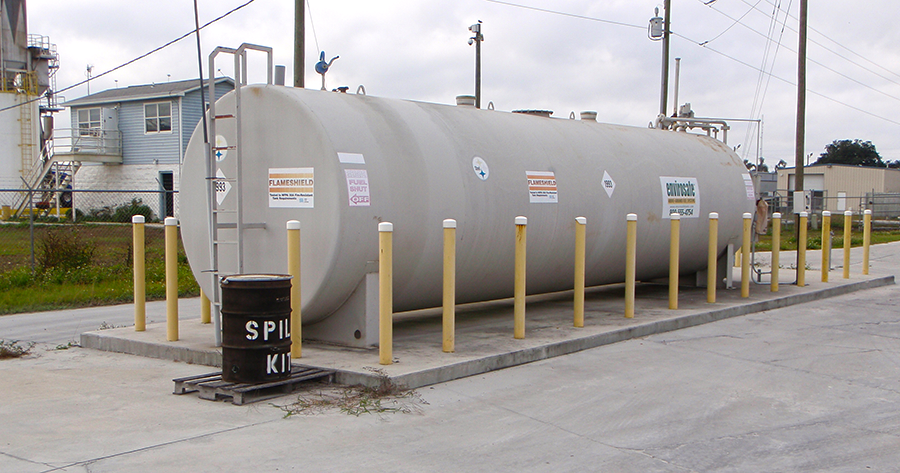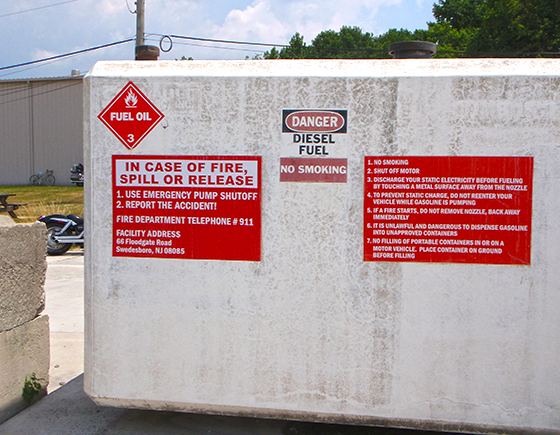We discuss why your city, county, or state isn't asking for SPCC Plans, and who enforces them.
Working on the road a lot, I get a chance to see a variety of industrial facilities all over the United States. If I ever had to say there's one constant in terms of non-compliance, I would have to say it's SPCC Plans. Why folks choose to ignore this cheap, simple, and extremely useful regulation is beyond me.
I've found that many folks out there, whether they're unfamiliar with regulations, or are just "pretending" to have never heard of them before, aren't in compliance with SPCC regulations, and it makes sense when you think about it.
SPCC regulations were written by the USEPA for any facility (meaning industrial, commercial, agricultural, etc.) that has at least 1,320-gallons of oil or petroleum products on-site. So if you have a small operation with a couple of barrels of motor or hydraulic oil, maybe a used oil tank, a heating oil tank, and a small diesel or gas tank, you could easily fall under the need for an SPCC Plan. We cover this more in-depth, including the benefits of having a plan, in our article what's an SPCC Plan?
By why aren't folks following the rules? What's the hesitation to get into compliance with this extremely basic, simple, and easy-to-use plan?

SPCC Plan Enforcement
What a lot of folks usually tell us when we start talking about SPCC Plans is simple. No one's asked to see them before. While that's generally a pretty weak defense, it does make sense since SPCC Plans are generally enforced by the USEPA.
You see, an SPCC Plan is required by Federal law under the Oil Pollution Prevention regulations (part of the Clean Water Act) which have been around since 1973. See why I say that's a pretty weak defense?
It requires that any facility subject to the regulations prepare and implement a Spill Prevention, Control and Countermeasure (SPCC) plan to prevent oil from reaching navigable waters and adjoining shorelines and to contain discharges of oil.
It's a plan designed to help you prevent spilling oil into a waterbody. Pretty simple, right?
Here's where it gets a little tricky. Most states in the U.S. are delegated for most parts of the Federal Clean Water Act (and other Federal environmental laws, rules, and regulations as well) and have administrative authority over their own individual programs. Which means, in most states, the Federal USEPA is rarely, if ever, seen from an enforcement standpoint. In most states, most facilities are administered and inspected by state, regional or local environmental agencies, not the USEPA.
So simply put, the EPA has never shown up to enforce their rule. Many facilities that do fall under the need for an SPCC Plan don't know it because the USEPA has never asked for it.
This means that your state, county, or city are most likely never going to ask to see your SPCC Plan because they don’t enforce it, don’t administer it, and usually don’t know much about it.
Does this mean you should ignore this regulation? No.
Let me give you a little story about one of my clients.
How SPCC Plans can help your organization.

About ten years ago, one of my clients had an issue with one of their employees and ultimately had to fire him. I don't know the details of the story, or why he was let go, but in the words of my client "things got real ugly".
About two nights after this employee was let go, someone who was never found, entered the facility after hours, zip-tied a fuel pump handle into the open position, and took the 15+ foot long hose and laid it in a way so the fuel (in this case off-road diesel) would drain down across the facility into a stormwater outfall location that discharged into a wetlands. The fuel pump was attached to a 10,000-gallon AST which was almost full.
My client shows up the next morning, and several thousand gallons of diesel fuel have now flown across his property, out a stormwater outfall, and into this relatively pristine wetlands. He turned to his SPCC Plan and followed the instructions to a T.
The fire department, police, state police, state environmental regulators, OSHA, and the USEPA were all on-scene eventually. Needless to say, my client was facing a world of trouble. OSHA and the police were conducting investigations, the news got involved. Again, things "got ugly".
But there was a saving grace here. The USEPA was ready to have a heart attack at first, but after reviewing the site, talking with personnel, and realizing that this facility not only had an SPCC Plan, but was conducting SPCC training, monthly inspections, and managed to follow the emergency procedures in their SPCC Plan correctly, changed their mind. They helped my client throughout the entire process, not as a criminal, but as a victim of a crime. The EPA made no bones about it, had they not had an SPCC Plan things would have gone very, very differently, meaning anything and everything from monetary fines to potential jail time.
More Help on SPCC Plans
With all that being said, if you're just hearing about a plan, or are weighing whether or not you should get one, I urge you to be on the safe side and get one. They are not even expensive, and you can learn rough estimates of what they'll cost you here in how much does an SPCC Plan cost?
If you're still feeling a little confused about SPCC plans and regulations and the requirements associated with having an SPCC plan, we've got a lot of great information here! Check out some of our most popular articles for more helpful SPCC information below.
If you meet the requirements for needing an SPCC plan (if you have >1,320 gallons of oil of any kind present in containers 55-gallon size and greater at your site, and have even a remote chance of discharging that oil to waters of the U.S.), then you need one. Plain and simple. Just because your state or local guy never let you know that you needed one won't get you off the hook.
To learn more about SPCC plans, and how your facility can benefit from having this easy-to-use, cost effective peace of mind, click here to contact us or give us a call at 609-693-8301.



